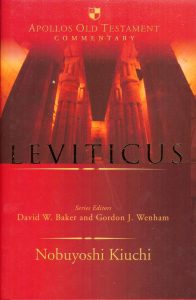The Apollos Old Testament Commentary series is a well-received Old Testament reference collection featuring the expertise of some of the best bible scholars in the world.
Apollos volumes would benefit pastors, professors, and knowledgeable Christians who desire to engage with current scholarship. Old Testament scholars David W. Baker and Gordon J. Wenham edit the series.

In addition to exegeting the text itself, each commentary discusses issues such the date the book was written, the author of the book, the source material (if applicable), the theology reflected in the book, as well as present-day application.
Note: Please see how the Apollos series compares to dozens of other commentary series on the Bible Commentaries Comparison Chart.
Which commentary series is best for your purposes? See Best Bible Commentaries: Top 50. Based on aggregate reviews.
Apollos Old Testament Commentaies (AOTC): Reviews
H. G. M. Williamson, FBA, Regius Professor of Hebrew, University of Oxford:
“What every preacher and student needs is a commentary that makes positive use of the results of scholarly research while at the same time integrating them sympathetically into a contemporary Christian theological worldview.
Many series have set out to achieve this, but few have succeeded. Now at last the Apollos series looks set to do so: the names of the editors and potential contributors, together with the evidence of these early volumes, all inspire confidence.”
Daniel Block, Professor of Old Testament, Wheaton College:
“At last! A commentary series that combines the best of biblical scholarship with a passion for the message of the text. Besides, it actually answers the questions I ask when I read the Scriptures.
This series by the finest evangelical scholars is designed for students and pastors who are serious about understanding the Old Testament in its context and translating its message for the church in the twenty-first century.”
Craig Bartholomew, Senior Research Fellow, University of Gloucestershire, editor of the Scripture and Hermeneutics series:
“Evangelical Old Testament study has made huge strides in the second half of the twentieth century. Tyndale House in the U.K. and IVP internationally were central to that renaissance.
And now at the start of the twenty-first century the Apollos Old Testament Commentary Series will build on that foundation as it showcases some of the best contemporary Old Testament interpretation.
This series rightly insists on rigorous scholarship but always in the service of the theology and message of the books of the Old Testament. Some outstanding scholars are signed up for this series, and I look forward very much to having these commentaries on my shelves as they appear.”
Purpose of the Apollos Old Testament Commentary Series
From the publisher: The Apollos Old Testament Commentary (AOTC) aims to take with equal seriousness the divine and human aspects of Scripture.
It expounds the books of the Old Testament in a scholarly manner accessible to non-experts, and it shows the relevance of the Old Testament to modern readers.
Written by an international team of scholars and edited by David W. Baker and Gordon J. Wenham, these commentaries are intended to serve the needs of those who preach from the Old Testament, as well as scholars and all serious students of the Bible.
The AOTC series introduces and examines the books of the Old Testament, bridging the gap between the age in which they were written and the age in which we now read them.
Each commentary begins with an Introduction which gives an overview of the issues of date, authorship, sources, and outlines the theology of the book, providing pointers towards its interpretation and contemporary application.
An annotated Translation of the Hebrew text by the author forms the basis for the subsequent commentary.
Within the commentary, Form and Structure sections examine the context, rhetorical devices, and source and form-critical issues of each passage.
Comment sections offer thorough, detailed exegesis of the historical and theological meaning of each passage, and Explanation sections offer a full exposition of the theological message within the framework of biblical theology and a commitment to the inspiration and authority of the Old Testament.
Interviews from the AOTC Series on Best Bible Commentaries
Preview: “I was particularly affected by the scene in Boaz’s field (Ruth 2), where Ruth shows up to glean. Ruth is the quintessential outsider, who enters Israel’s space uninvited and perhaps unwanted.
Boaz epitomizes the ancient virtue of hospitality: welcoming the stranger. Boaz becomes Ruth’s advocate, drawing her from the periphery to the center of the community, telling her she belongs with them, providing for her, and protecting her.
What a powerful vision for the church in a world of massive migrations, intensifying poverty at home and abroad, and polarizing racial and ethnic tensions!”
Preview: “A fascinating feature of Samuel is seeing how God continues to work with people who are far from satisfactory.
None of Samuel, Saul or David come across as wholly positive people – each is in some way deeply flawed, and the same is true of Israel as a people. And yet, God continues to work with these people, not giving up on them because he has a purpose of bringing blessing through them.
Of course, the promise to David in 2 Samuel 7 is really the seedbed for so much of the Old Testament’s messianic hope, but seeing this in the context of such fallible people is a wonderful reminder of how God’s grace does not give up on us.”
Also see: Joshua Moon’s interview on Hosea
Volumes in the Apollos Old Testament Commentary Series
The links below go to Amazon, which sells new and used books. Also visit Christian Book Distributors’ Apollos commentaries page to compare.
In this Apollos Old Testament Commentary volume, Desmond Alexander grapples with the many and varied complexities of the carefully constructed literary collage of Exodus.
As an integral part of the longer narrative that runs from Genesis to 2 Kings, Exodus recounts a dramatic and unified story of how the Israelites come to a deep and close relationship with the Lord God.
Narrating past events, Exodus speaks to contemporary society, revealing a God who passionately desires to draw people into an intimate and exclusive relationship with himself. This detailed commentary sheds fresh light on one of the most influential books ever written.
In this excellent commentary, Nobuyoshi Kiuchi offers in-depth discussion of the theology and symbolism of Leviticus.
He argues that its laws present an exceedingly high standard, arising from divine holiness, and the giving of these laws to the Israelites is intended to make them aware of their sinfulness, to lead them to hopelessness and ultimately to destroy their egocentric nature.
In this outstanding commentary J. G. McConville offers a theological interpretation of the Old Testament book of Deuteronomy in the context of the biblical canon.
He gives due attention to historical issues where these bear on what can be known about the settings in which the text emerged. His dominant method is one that approaches Deauteronomy as a finished work.
In this volume, Pekka Pitkänen shows the relevance of Joshua to modern readers. While he remains anchored in the world of the text throughout the commentary, Pitkänen brings contemporary geopolitical issues (like the Israeli-Palestinian conflict) to bear on Joshua and the genocidal “Israelite conquest tradition.”
L. Daniel Hawk undertakes a detailed narrative analysis of Ruth that goes beyond the description of its content and stylistic features to illumine its deep structure and use of metaphor.
Informed by contemporary studies on ethnicity, he discovers a work of remarkable sophistication that employs a story of intermarriage to address opposing ideas of Israelite identity.
Hawk’s meticulous attention to patterned structures, stylistic devices and characterization reveals the strategy by which the narrator constructs a vision of Israel that looks beyond rigid internal boundaries to the welcome of faithful foreigners as agents of blessing.
1 and 2 Samuel – David G. Firth
This commentary begins with an Introduction, which gives an overview of the issues of date, authorship, sources and so on, but which also outlines more fully than usual the theology of 1 and 2 Samuel, and provides pointers toward its interpretation and contemporary application.
1 and 2 Kings – Lissa Wray Beal
Lissa M. Wray Beal’s valuable commentary examines the successes and failures of monarchy in the divided kingdoms. It works with the final form of the biblical text and pursues historiographical, narrative and theological questions, including the relation of each chapter’s themes to biblical theology.
While it focuses on theological and narrative concerns, the commentary gives due attention to complex historical issues. It seeks to provide a nuanced reading that is faithful to the text’s message.
Ecclesiastes and the Song of Songs – Daniel C. Fredericks and Daniel J. Estes
This volume by Daniel J. Estes and Daniel C. Fredericks expounds the books of Ecclesiastes and Song of Songs in a scholarly manner, and it shows the relevance of these important books to today’s readers.
With even-handedness and clarity, Lucas demonstrates that, for preachers and teachers, there is much in Daniel that is fairly readily understandable and applicable, and that there are also theological depths that are rewarding for those willing to plumb them and wrestle with the issues they raise.
In this Apollos Old Testament Commentary, Joshua Moon sets the prophecies of Hosea in the context of the eighth century BC.
The concern of his commentary is the importance of reading Hosea as Christian scripture, in which we are meant to hear God’s own voice as he calls his people to himself.
Moon demonstrates the continuing importance of hearing God’s words through Hosea, situating the reading of each section within larger biblical and theological concerns.
Haggai, Zechariah and Malachi – Anthony R. Petterson
In this Apollos Old Testament Commentary, Anthony Petterson offers detailed commentary on these prophetic books, setting them in their wider biblical-theological context.
He shows the connections between the post-exilic world and our own, and explains how these books contain a vital message for the church today, living in the gap between promise and reality.
Also see the New Century Bible Commentary series

